11b. Loyalists, Fence-sitters, and
Patriots
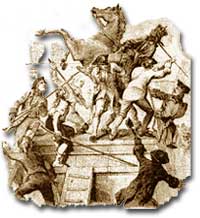
After patriots
tore down the statue of King George III in New York City on July
9, 1776, they melted parts of it down and made bullets to use
against the British.
It is impossible to know the exact number of American colonists
who favored or opposed independence.
For years it was widely believed that one third
favored the Revolution, one third opposed it, and one third were
undecided. This stems from an estimate made by John Adams in his
personal writings in 1815.
Historians have since concluded that Adams was
referring to American attitudes toward the French Revolution,
not ours. The current thought is that about 20 percent of the
colonists were Loyalists — those
whose remained loyal to England and King George. Another small
group in terms of percentage were the dedicated patriots, for whom there was no
alternative but independence.
On the Fence
Often overlooked are the fence-sitters who made up the largest
group.
With so many Americans undecided, the war
became in great measure a battle to win popular support. If the
patriots could succeed in selling their ideas of revolution to
the public, then popular support might follow and the British
would be doomed.
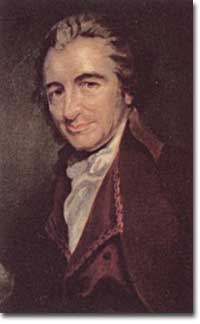
In "Common Sense," Thomas
Paine argued for independence from Britain and the creation of a
democratic republic. Its publication in January 1776 immediately
added fuel to the patriots' cause.
Even with military victory, it would have been
impossible for the Crown to regain the allegiance of the people.
Revolution would merely flare up at a later date.
The British understood the need to attract
American popular support for the parent country, as well. Some
colonists who were not persuaded by the political struggle
joined the British for personal gain or military glory. Some
joined out of sheer loyalty to the Crown — they still believed
themselves loyal British citizens. There were also many American
farmers willing to sell their goods to the British for profit.
In the long run, however, the patriots were
much more successful attracting support. American patriots won
the war of propaganda. Committees of Correspondence persuaded
many fence-sitters to join the patriot cause. Writings such as
Thomas Paine's "Common Sense" stirred newfound American
nationalism.
Excerpt
of "Common Sense"
IN the following pages I offer nothing more than simple
facts, plain arguments, and common sense: and have no other
preliminaries to settle with the reader, than that he will
divest himself of prejudice and prepossession, and suffer
his reason and his feelings to determine for themselves that
he will put on, or rather that he will not put off, the true
character of a man, and generously enlarge his views beyond
the present day ...
The Sun never shined on a cause of greater worth. 'Tis not
the affair of a City, a County, a Province, or a Kingdom;
but of a Continent — of at least one-eighth part of the
habitable Globe. 'Tis not the concern of a day, a year, or
an age; posterity are virtually involved in the contest, and
will be more or less affected even to the end of time, by
the proceedings now. Now is the seed-time of Continental
union, faith and honour. The least fracture now will be like
a name engraved with the point of a pin on the tender rind
of a young oak; the wound would enlarge with the tree, and
posterity read in it full grown characters.
– Thomas Paine, "Common Sense" (1776)
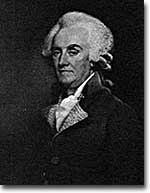 .The American Revolution not only
separated neighbors and friends, it devastated many families,
including the Franklins. William Franklin, pictured here, a
Loyalist, rarely, if ever, spoke to his Patriot father Ben
after the war
.The American Revolution not only
separated neighbors and friends, it devastated many families,
including the Franklins. William Franklin, pictured here, a
Loyalist, rarely, if ever, spoke to his Patriot father Ben
after the war
Patriots subjected Loyalists to public
humiliation and violence. Many Loyalists found their property
vandalized, looted, and burned. The patriots controlled public
discourse. Woe to the citizen who publicly proclaimed sympathy
to Britain.
Families were sometimes divided over the
revolution. Benjamin Franklin's son, William, a Loyalist
governor of New Jersey, supported the British effort during the
war.
What Happened to the Loyalists?
In the end, many Loyalists simply left America.
About 80,000 of them fled to Canada or Britain during or just
after the war. Because Loyalists were often wealthy, educated,
older, and Anglican, the American social fabric was altered by
their departure. American history brands them as traitors. But
most were just trying to maintain the lifestyles to which they
had become accustomed. After all, history is always written by
the winners.
American
Patriot Judge Charles Lynch
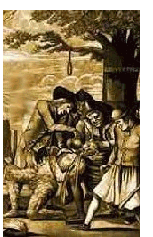 Although the meaning is probably universally known, the
origin of the term 'to Lynch' seems to have been almost lost
in time, probably because it conjures up too horrific a
scene to be compatible with the so called 'glorious' cause.
Although the meaning is probably universally known, the
origin of the term 'to Lynch' seems to have been almost lost
in time, probably because it conjures up too horrific a
scene to be compatible with the so called 'glorious' cause.
In the 18th century American hinterland,
rouge settlers used to just brutally take over Indian land
and this was most likely the case for a certain Lynch clan,
who settled either side of the Staunton River in the Blue
Ridge foothills of the Appalachian Mountains, western
Virginia.
Even in 1774 the nearest courthouse was
over two hundred miles away when Charles son of John Lynch
decided to join the Virginia legislature to serve as a
Justice of the Peace in Pittsylvania County.
In
this role he had to deal with horse thieves and got used to
handing out harsh punishments, as the accused could either
receive 39 lashes, be strung up by the thumbs or hung.
During the
American Revolution matters had became tense between the
colonists, with the Loyalists under constant threat by
intimidating gangs of Patriots, while Loyalists in turn
pointed out to the British the illegal activities of
patriots and revealing the lairs of smugglers.
Charles Lynch
an ardent patriot, was active in equipping and mobilizing
the insurgency, therefore no doubt stealing horses from
Loyalists, so when Sir Henry Clinton's force convincingly
took Charleston in April 1780 this generated much excitement
in the local Loyalists who then started to prepare to join
his army.
At least half the residents in
Southside Virginia were considered to be 'Tories' and were
then an increased threat to the Patriots, so they decided to
act first, Charles Lynch used his position to check records
to identify suspected Loyalists and in fact found them so
numerous they were going to be easy to find. Armed with this
information he self-appointed himself jury and sent out
gangs of Patriot zealots to systematically visit the
homesteads of these 'suspects'.
Under the guise of the law these mobs
claimed that Loyalists were guilty of the heinous and
felonious crime of treason, for which anyone likely to be a
threat to them, was arbitrarily dragged out of their homes
and strung up.
If the suspect was known to have been
wealthy he was considered a Loyalist and fined thousands of
pounds under the threat of lynching, but only to be then
lynched by them anyway. This
one sided situation was mainly because Patriots were used to
organising themselves as generally contemptuous of British
laws considering them oppressors, whereas the Loyalists
would look to the law, but were at a servere disadvantage
when the law was being abused by a Judge and bands of
lowlife bigots.
These days
the remaining focus of these atrocities is at Charles
Lynch's former home at Green level (now Avoca) where hanging
may have taken place from a walnut tree, the stump of which
still remains, but a plaque has been placed there stating
that no one was hung by Charles lynch on that spot. This may
or may not be actually true, but it's inference is at least
deceiving if not out right laughable. As
this statement is made ridiculous, by the fact that lynching
was still being carried out in the south and mid United
States until well into the 20th century e.g.Ku Klux Klan and
that parts of Virginia went from having a majority of
Loyalists to that of virtually none, meaning that hundreds
if not thousands of Loyalists were lynched.
Also after
the war in the new United States, Laws were passed to allow
no recourse against those who carried out the lynchings,
either in Virginia or at any other location. Obviously no
records exist, long since covered over by American
authorities and historians, but Charles Lynch was exonerated
by the state legislature and is considered to have an
untarnished reputation as a patriot in his relentless quest
to 'expose' Loyalists!
It was not until the 20th century that America developed a
revulsion against lynching, so it's hard to find any
unsanitized accounts of the notorious despot patriot Judge
Lynch.
Treaty of Tripoli
Unlike governments of the past, the American
Fathers set up a government divorced from religion. The
establishment of a secular government did not require a
reflection to themselves about its origin; they knew this as an
unspoken given. However, as the U.S. delved into international
affairs, few foreign nations knew about the intentions of
America. For this reason, an insight from at a little known but
legal document written in the late 1700s explicitly reveals the
secular nature of the United States to a foreign nation.
Officially called the "Treaty of peace and friendship between
the United States of America and the Bey and Subjects of
Tripoli, of Barbary," most refer to it as simply the Treaty of
Tripoli. In Article 11, it states:
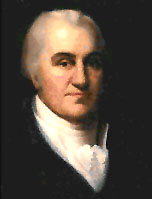 Joel Barlow, U.S. Consul General
of Algiers
Joel Barlow, U.S. Consul General
of Algiers
Copyright National Portait Gallery Smithsonian
Institution/Art Resource NY
"As the Government of the United States of
America is not in any sense
founded on the Christian religion; as it has in itself
no character of enmity against
the laws, religion, or tranquillity, of Musselmen; and
as the said States never have entered into any war or act of
hostility against any Mehomitan nation, it is declared by the
parties that no pretext arising from religious opinions shall
ever produce an interruption of the harmony existing between the
two countries."
The preliminary treaty began with a signing on
4 November, 1796 (the end of George Washington's last term as
president). Joel Barlow, the American diplomat served as counsel
to Algiers and held responsibility for the treaty negotiations.
Barlow had once served under Washington as a chaplain in the
revolutionary army. He became good friends with Paine,
Jefferson, and read Enlightenment
literature. Later he abandoned Christian orthodoxy for
rationalism and became an advocate of secular government.
Barlow, along with his associate, Captain Richard O'Brien, et
al, translated and modified the Arabic version of the treaty
into English. From this came the added Amendment 11. Barlow
forwarded the treaty to U.S. legislators for approval in 1797.
Timothy Pickering, the secretary of state, endorsed it and John
Adams concurred (now during his presidency), sending the
document on to the Senate. The Senate approved the treaty on
June 7, 1797, and officially ratified by the Senate with John
Adams signature on 10 June, 1797. All during this multi-review
process, the wording of Article 11 never raised the slightest
concern. The treaty even became public through its publication
in The Philadelphia Gazette on 17 June 1797.
So here we have a clear admission by the United States that our government did not found
itself upon Christianity. Unlike the Declaration of
Independence, this treaty represented U.S. law as all treaties
do according to the Constitution (see Article VI, Sect. 2).
Although the Christian exclusionary wording in the Treaty of
Tripoli only lasted for eight years and no longer has legal
status, it clearly represented the feelings of our Founding
Fathers at the beginning of the U.S. government.
Conclusion
The Framers derived an independent government
out of Enlightenment thinking
against the grievances caused by Great Britain.(Protestant Great Britain)
Our Founders paid little heed to political beliefs
about Christianity.(American Revolution ended Protestant rule,
and gave us a Universal
government)The 1st Amendment stands as the bulkhead
against an establishment of religion and at the same time
insures the free expression of any belief.(the mass is now made
legal) The Treaty of Tripoli, an instrument of the Constitution,
clearly stated our non-Christian foundation. We inherited common law
from Great Britain which derived from pre-Christian Saxons
rather than from Biblical
scripture.
Today we have powerful Christian organizations(Ecumenism)
who work to spread historical myths(David Barton Myths)
about early America and attempt to bring a Christian theocracy(Roman
Catholicism) to the government. If this ever happens, then
indeed, we will have ignored the lessons from history.
Fortunately, most liberal Christians today agree with the
principles of separation of church and State,
just as they did in early America.
"They all attributed the peaceful dominion of
religion in their country mainly to the separation of church and
state.(Do you call this
separation of church and state click
here) I do not hesitate to affirm that during my
stay in America I did not meet a single individual, of the
clergy or the laity, who was not of the same opinion on this
point"
-Alexis de Tocqueville, Democracy in America, 1835
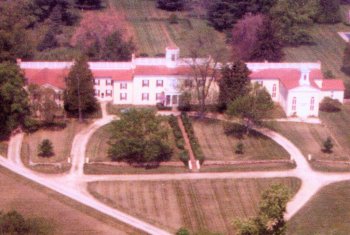
Historic
Significance: Doughoregan Manor is a national
treasure located in the heart of Howard County. It is a
designated National Landmark of international importance, as the man who called it
his home triggered events in the 1700's that changed
the face of the world.
Threat:
Development.
A
Maryland Historic
Trust Easement protecting the property expired in May of 2007.
The current family is contemplating development and
preservation options.
Doughoregan
Manor
was built circa 1725 by Charles Carroll The Settler, and his son
Charles Carroll of
Annapolis. Charles Carroll III (the grandson of the Settler) was
one of four patriots from
Maryland who signed the Declaration of Independence.
As the only Roman Catholic
Signer and, at the time, the richest man in America, he had everything to lose
in his pursuit of liberty and of freedom of religion.
He is interred in the private Catholic chapel on the grounds of
his beloved home. Doughoregan Manor was a frequent destination
of many patriots, including George
Washington, Samuel Adams, Benjamin Franklin and John Hancock.(George
Washington was his neigbor)
Additional historic features include one of the
earliest private Catholic
Chapels in Maryland; existing significant outbuildings,
including barns and slave
quarters; and historic cemeteries. The Carrolls were
instrumental in creating the first leg of the National Road,
which ran from Baltimore City to Ellicott City and westward to
the Cumberland Gap. The road, which runs along the northern
border of Doughoregan, was designated by Congress in 2002 as an
"America’s Byway" - one of only two in Maryland. In 1998, it was
designated by the Maryland
State Highway Administration as a "Scenic Byway."
"He who postpones till to-morrow what can and ought to be done
to-day, will never thrive in this world. It was not by procrastination
this estate was acquired, but by activity, thought,
perseverance, and economy,(He was one of the most
wealthiest men in the colonys) and by the same means it
must be preserved and prevented from melting away." The Catholic founding Fathers. Click here
- Charles Carroll(click here) of
Carrollton, July 10, 1801
In this world it really does not matter
what your personal religious beliefs are, but what is
happening in the world today has everything to do with Religion(Rome).
It does not matter if you believe in them or not, if
the people who believe in them hold positions of power this
will most assuredly affect you.
Who Rules?

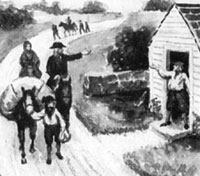
 After patriots
tore down the statue of King George III in New York City on July
9, 1776, they melted parts of it down and made bullets to use
against the British.
After patriots
tore down the statue of King George III in New York City on July
9, 1776, they melted parts of it down and made bullets to use
against the British.  In "Common Sense," Thomas
Paine argued for independence from Britain and the creation of a
democratic republic. Its publication in January 1776 immediately
added fuel to the patriots' cause.
In "Common Sense," Thomas
Paine argued for independence from Britain and the creation of a
democratic republic. Its publication in January 1776 immediately
added fuel to the patriots' cause.  .The American Revolution not only
separated neighbors and friends, it devastated many families,
including the Franklins. William Franklin, pictured here, a
Loyalist, rarely, if ever, spoke to his Patriot father Ben
after the war
.The American Revolution not only
separated neighbors and friends, it devastated many families,
including the Franklins. William Franklin, pictured here, a
Loyalist, rarely, if ever, spoke to his Patriot father Ben
after the war Although the meaning is probably universally known, the
origin of the term 'to Lynch' seems to have been almost lost
in time, probably because it conjures up too horrific a
scene to be compatible with the so called 'glorious' cause.
Although the meaning is probably universally known, the
origin of the term 'to Lynch' seems to have been almost lost
in time, probably because it conjures up too horrific a
scene to be compatible with the so called 'glorious' cause.
 Joel Barlow, U.S. Consul General
of Algiers
Joel Barlow, U.S. Consul General
of Algiers